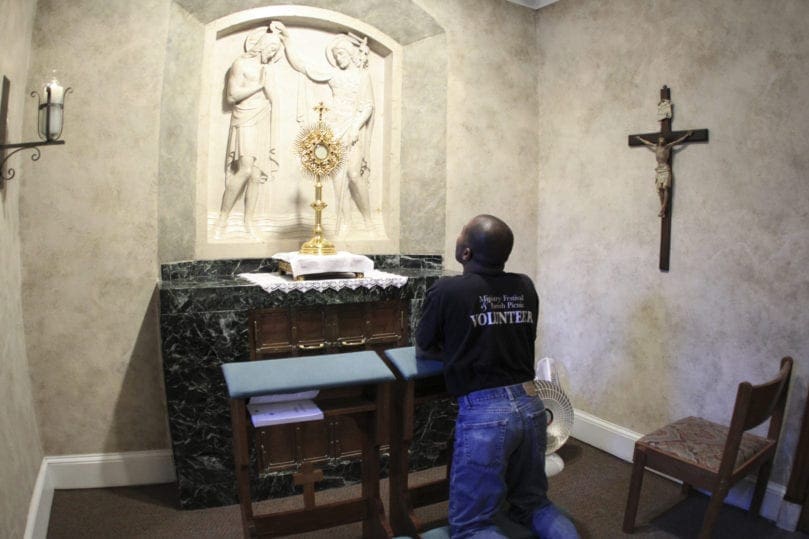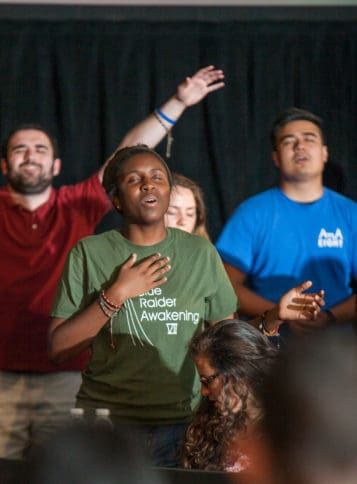 Photo by Michael Alexander
Photo by Michael AlexanderAtlanta
Campaign begins for Atlanta Catholics to rediscover the Eucharist
By ANDREW NELSON, Staff Writer | Published June 10, 2021
ATLANTA–The Archdiocese of Atlanta is starting a multiyear initiative to develop and deepen an appreciation of the Eucharist.
The Solemnity of the Most Holy Body and Blood of Christ, on June 6, started the year. Its focus is to help Catholics understand the Eucharist and how it has fed and inspired the faithful since Jesus’ Last Supper.
The campaign called “Come to Me” will focus on the real presence of Christ in holy Communion. Churches and missions across the 69 counties of the archdiocese are to host programs to help rediscover this core tenet of the church.
A task force collected resources for parishes, schools and individuals in English and Spanish.
Archbishop Gregory J. Hartmayer, OFM Conv., said understanding the Eucharist can serve as a jumping-off point to a deeper faith. He said Catholics inspired by the sacrament can better take up Jesus’ mission.
“The Eucharist is the source and summit of all that we believe and all that we experience. It is from the Eucharist that we, too, are commissioned to go forth and to feed others, to share with others, to see that people who are without have what they need,” he said in an interview in early May.
Church members renewed with the body and blood of Christ will have “the energy and the commission to go forth and to do what we can to address these (contemporary social) issues, both individually and as a church,” he said.
His words echo the Catechism of the Catholic Church, which states: “The other sacraments, and indeed all ecclesiastical ministries and works of the apostolate, are bound up with the Eucharist and are oriented toward it.”
Decades of the Eucharistic Congress
What started as a desire to open an adoration chapel at Atlanta’s Cathedral of Christ the King in 1994 turned into the largest celebration of the Eucharist in the southeast.
Tens of thousands of Catholics in north and central Georgia came together to praise the Eucharist. From flag waving and drum beating to cultural dancing, the procession showcased the diversity of the church in Atlanta. Speakers shared messages of faith in French, Spanish, English, American Sign Language and Vietnamese. The event was held annually until being canceled last year and this year because of the pandemic. Plans for future congresses will be determined this summer.
The inaugural congress in 1995 and introduction of the Life in the Eucharist ministries (LITE) at the parish level were part of renewal efforts undertaken by the late Archbishop John F. Donoghue.

Young Catholics sing during praise and worship at a Friday evening Revive Track at the 2017 Eucharistic Congress in Atlanta. Photo by Thomas Spink
LITE presenters, clergy and laypeople, promote a true understanding of the Eucharist and how the mystery of Jesus’ life, death and resurrection is integrated in their own lives.
Catholics’ belief about the Real Presence
This new archdiocesan effort comes at a time when self-identified Catholics express an understanding of the Eucharist that is different from official church teaching. The decline in the eucharistic faith began before the pandemic.
Catholics believe in the Eucharist, but what it means depends on who does the asking.
A Pew Research Center survey in 2019 found one of three Catholics confirmed belief in the bread and wine becoming the body and blood of Christ. But a 2011 survey found a much higher number, with two-thirds of adult Catholics believing “at the consecration during a Catholic Mass, the bread and wine really become the body and blood of Jesus Christ.”
Archbishop Hartmayer said, “The Eucharist hasn’t changed. It’s we who have changed. And so we’ve got to invite people back to a prayerful and a spiritual understanding of why Christ said ‘Do this in my memory.’ And it’s from the Eucharist that we get the strength that we need.”
Parish life focus of renewal
Parishes and the Archdiocese of Atlanta are being intentional about inviting believers to deepen their spiritual life, through traditional Catholic devotions. Parishes are encouraged to hold eucharistic processions, consider adoration in chapels and participate in other local events.
Eucharistic renewal is “calling the church, and that means kind of calling all of us as Catholics, back to our roots,” said Andy Lichtenwalner, a member of the renewal steering committee and director of the Office of Formation and Discipleship.
The Eucharist is the “lifeblood” of the church, but at times Catholics can get a little “dull to it,” he said.
While the pandemic kept many people away from the church for an extended time, here’s an opportunity for parishes to help people reconnect with the church’s central belief and support a path of discipleship, he said.
The study by Pew on holy Communion shows “we still have to make the turn to what Pope Francis has called the missionary and pastoral conversion of the church. It’s not enough for us to kind of be settled,” said Lichtenwalner.
Father John Koziol, OFM Conv., pastor of St. Philip Benizi Church, Jonesboro, and a member of the steering committee, said his parish was to host an overnight adoration leading to Corpus Christi.
“A large number of people have signed up to spend the night, taking turns spending the night in church,” he said.
In July, the parish will resume 24-hour adoration. Father Koziol hopes this renewal spurs people to a deeper appreciation for Mass, in addition to seeing the link between Eucharist and social justice.
The Eucharist is key to how faith is lived “in our communities, in the way that we reach out to the disenfranchised and marginalized, immigrants, refugees, people who don’t have someone to speak for them,” he said.
Father Henry Atem is pastor of St. Lawrence Church, Lawrenceville, and a member of the steering committee. At three parishes where he has served, Father Atem said he made it a point to expand eucharistic adoration, giving more people an opportunity to participate in prayer. Father Atem said he has seen Hispanic community members embrace the practice.
His hope for the campaign is “a sense of awe that ought to be given to the holy Eucharist,” he said. “That is our treasure, our foundation in which we are able to proclaim God to society.”
To other pastors, he suggests linking the communal celebration of the Mass with the personal renewal of praying in front of the Eucharist.
St. Luke Church in Dahlonega planned a celebration of the Eucharist in a public park with music, speakers and a procession, said organizer Kerri Allen. She helped start the archdiocesan Eucharistic Congress.
“I hope it would reach those who have maybe been away from the church, especially during this pandemic when it got a little easy to watch on TV. You know you can watch it on TV and that’s nice, but you can’t receive the Eucharist. I believe our parish will be blessed for doing this,” she said.
As pandemic restrictions are lifted, many parishes are reopening their eucharistic chapels. In the chapels, people offer a centuries-old tradition of prayer. The feast of Corpus Christi developed in the 13th and 14th centuries. Large eucharistic congresses took off in the 19th century.
Centering on the Eucharist does not need to be complicated. It takes willing volunteers in chapels. In them, people gather to silently pray. Some bring a book of prayers, others sit and reflect on the day. Parishes offer these traditional prayer times tailored to their communities—some offer special 24-hour perpetual prayer, others several hours a day and some are special times during the month.
“It’s that simple. It doesn’t have to be that complicated. There is no ritual that we have to follow,” said Archbishop Hartmayer. “There’s not anything that we have to do, other than simply rest in (Christ’s) presence. And listen, listen to our own conscience, listen to our own heart, listen to the examination of our own behavior and relationship to others.”
Staff Writer Samantha Smith contributed to the article.